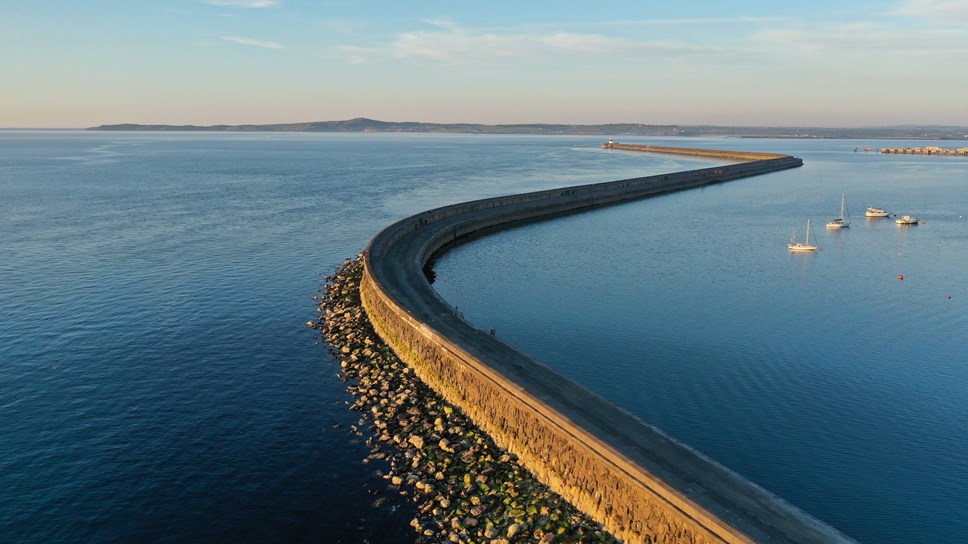
Welsh Government to invest £40m to refurbish Breakwater and secure future of Holyhead Port
Llywodraeth Cymru i fuddsoddi £40 miliwn i adnewyddu Morglawdd a sicrhau dyfodol Porthladd Caergybi
- £40m investment will help refurbish the 150-year-old Holyhead Breakwater, which is gradually being eroded by the Irish Sea.
- The superstructure – the longest in the UK - provides essential protection to the Port of Holyhead which protects the infrastructure and allows ships to dock safely.
The First Minister Mark Drakeford has today announced a £40m funding package from the Welsh Government to allow the refurbishment of the Holyhead Breakwater and help safeguard Holyhead Port’s long-term future.
The 2.4km long Victorian breakwater provides essential protection to Holyhead Port. Without it, the wave conditions would be too severe for the operation of ferries and could result in the loss of service and ultimately the closure of the Port. The breakwater also protects several businesses and premises from flooding.
The masonry breakwater, built approximately 150 years ago, is founded on a rubble mound built on the seabed. Since its construction it has gradually been eroded by the Irish Sea. The stability of the breakwater is now under threat, with an increasing probability of a breach in the structure occurring during storm conditions.
Holyhead is the busiest UK port for accompanied roll-on/roll-off freight traffic for Irish Sea ports. It is a critical link between the UK, the Republic of Ireland and the EU, and a key employer on Anglesey, supporting around 700 local jobs.
The £40m package, made up of a £20m loan and a £20m grant, will go towards the estimated £110m cost of refurbishing the Breakwater.
First Minister Mark Drakeford said:
“Holyhead Port is an important asset to North Wales. This £40m investment in the breakwater will help ensure the port’s future and protect jobs.
“The port is of vital strategic importance. It plays a crucial role in the delivery of economic prosperity for the region and is also a key part of our transport infrastructure.
“Today’s announcement is a positive development for Ynys Mon and demonstrates the Welsh Government’s firm commitment to the island.”
Ian Davies, Head of UK Port Authorities at Stena Line Ports Ltd, which operates the Port of Holyhead, said:
“We welcome the investment support from the Welsh Government, in addition to the sum pledged by the UK Government earlier this year. This support contributes significantly to the planned £100m+ investment in the breakwater, which will ensure a long-term and robust refurbishment of this vital piece of infrastructure.
“As the second busiest roll on/roll off port in the UK, Holyhead Port is a key transport link between the UK, Ireland and the rest of Europe moving millions of tonnes of goods and transporting thousands of passengers each year.
“Looking to the future of the port and wider Anglesey, we are seeking to build with our partners Anglesey County Council on the award of Anglesey Freeport status to boost industry and investment in the region, which will serve to support the local and North Wales Economy. The refurbishment of the breakwater and securing the protection of the Port and surrounding area is crucial to that long-term plan and we’re grateful that the Welsh and UK Governments have recognised its importance.”
Economy Minister, Vaughan Gething said:
“I very much hope that by resolving the breakwater issue we are giving confidence to the private sector to invest in the port and surrounding area, which will open up exciting new opportunities.
“Both the Welsh and UK Governments saw the ambition and promise in the Ynys Mon Freeport bid and agreed for it to proceed to the next stage. I look forward to the port outlining in its business case how the Freeport will play a key role in supporting the development of the new green industries of the future.
“I expect the Freeport to not only help create thousands of new jobs on Anglesey and in North Wales, but also support the Welsh Government’s ambitious Net Zero agenda.”
Notes to editors
Photo credit: John Davies
